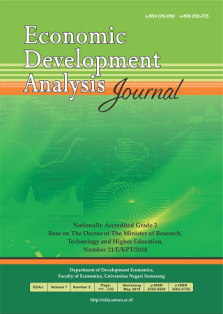Do Government Policies and Socioeconomic Conditions Affect Income Inequality?
Abstract
The problem that is often faced by developing countries is high-income inequality among the population. On the other hand, the development of digital technology occurs very quickly and encourages the community to play a more active role in economic activities. This condition needs to be further explored, especially considering its relation to income inequality in Indonesia. This study aims to determine the effect of government policies and socioeconomic conditions on income inequality in Indonesia in the 2019-2021 period by analyzing secondary data in 34 provinces in Indonesia. The analytical method uses panel data regression with the selected model of the fixed effect model. The data was taken from the Central Bureau of Statistics, each provincial government's Directorate General of Finance, and the Ministry of Manpower of the Republic of Indonesia. The results showed that the number of poor people significantly positively affected income inequality and regional minimum wages, and the information and communication technology development index negatively affected income inequality. In contrast, the human development index and social assistance spending had no impact on income inequality. The government must improve poverty alleviation programs to reduce the income inequality gap while expanding the accessibility of Information and Communication Technology (ICT) to provide a better quality of life for the people. This study enriches previous research on the effect of socioeconomic conditions on income inequality by adding the newly developed ICT development index variable


